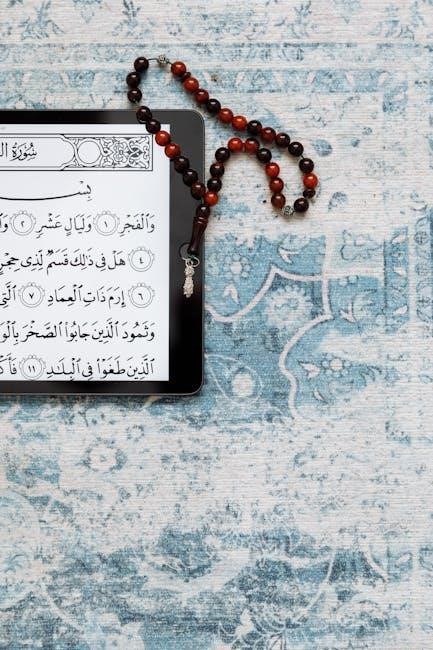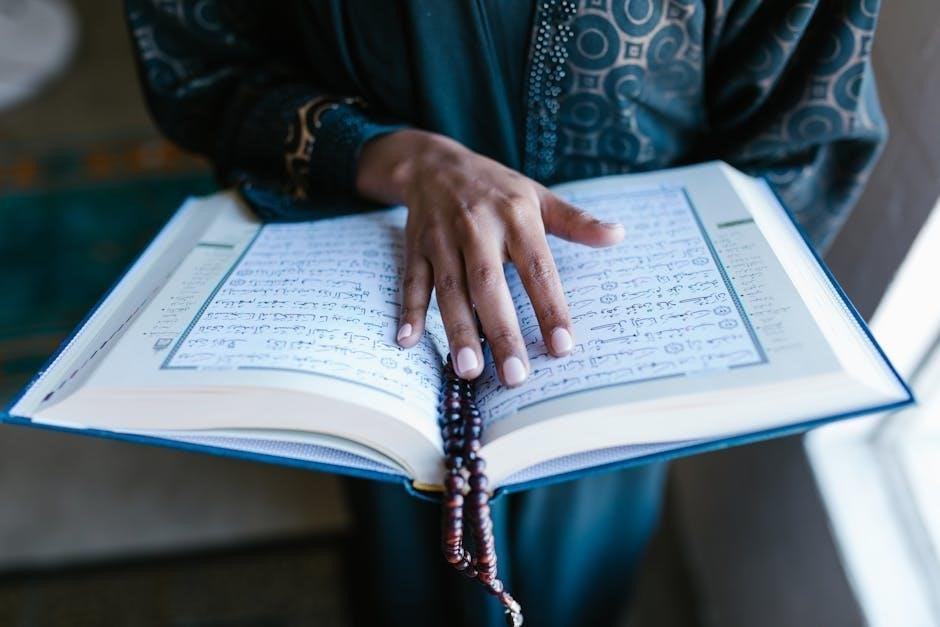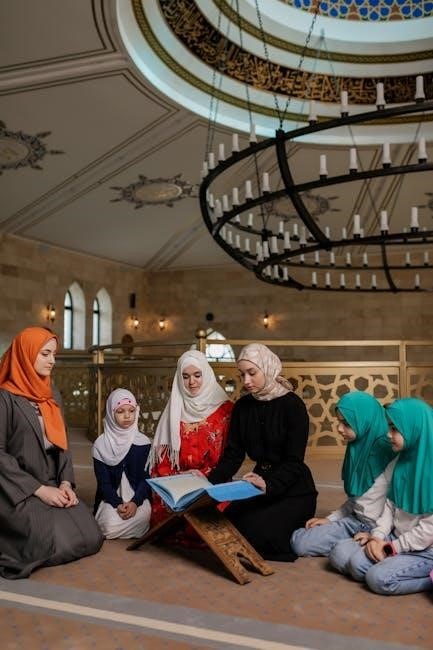The 30 Para of the Quran is a compilation of the last chapters, known for their concise language and profound teachings on worship, morality, and spiritual growth․
Overview of the 30th Para
The 30th Para of the Quran encompasses the final chapters of the Holy Book, known for their brevity and profound spiritual significance․ It includes Surahs such as Al-Nas, Al-Falaq, and Al-Ikhlas, which are frequently recited in daily prayers․ These chapters focus on themes of protection, faith, and the oneness of Allah, offering guidance for believers in their daily lives․ The 30th Para is also valued for its simplicity, making it accessible for memorization and reflection․ Its concise structure allows for easy recitation, while its deep meanings provide a foundation for understanding Islamic teachings․ This Para is particularly cherished for its ability to inspire mindfulness and devotion, making it a vital part of Quranic study and worship․
Significance of the 30th Para in Islamic Studies
The 30th Para holds immense significance in Islamic studies as it embodies foundational teachings of the Quran․ It serves as a cornerstone for understanding Islamic principles, ethics, and spirituality․ This section is particularly valued for its concise yet profound lessons, making it a focus for both beginners and advanced scholars․ The 30th Para is often memorized and recited due to its brevity and deep meanings, which emphasize the oneness of Allah, moral guidance, and spiritual purification․ It is also a vital tool in Islamic education, helping learners grasp core concepts before progressing to more complex teachings․ By studying this Para, believers gain insights into worship, faith, and righteous living, fostering a deeper connection with Allah and strengthening their moral and spiritual foundation․
Structure and Content of the 30 Para
The 30 Para consists of 36 Surahs and 1,463 verses, focusing on essential Islamic teachings, worship, and moral guidelines․ Its content emphasizes spirituality and daily life․
Surahs Included in the 30th Para
The 30th Para, or Juz Amma, encompasses the final 36 Surahs of the Quran, starting from Surah An-Naba’ (78) to Surah An-Nas (114)․ These Surahs are concise yet profound, focusing on themes such as the Day of Judgment, divine mercy, and moral guidance․ Surah Al-Fatihah, while not part of this Para, is essential for daily prayers, emphasizing the worshipper’s dependence on Allah․ This collection of Surahs is particularly cherished for its ease of memorization and recitation, making it a cornerstone of Islamic education and daily worship․ Many Muslims memorize these Surahs to deepen their spiritual connection and apply their teachings in everyday life․
Themes and Topics Covered
The 30th Para of the Quran covers a wide range of themes, including the Day of Judgment, divine mercy, and moral guidance․ It emphasizes the oneness of Allah (Tawhid) and encourages believers to seek forgiveness and live righteous lives․ Many Surahs in this Para focus on the consequences of disbelief and the rewards of faith, while others provide comfort and reassurance to believers facing challenges․ The Para also includes numerous supplications (Duas) and prayers, such as those found in Surah Al-Mu’minun and Surah Al-Furqan, which guide Muslims in seeking Allah’s mercy and protection․ These teachings are essential for spiritual growth and fostering a strong connection with Allah․
Key Verses and Their Meanings
The 30th Para contains several key verses that hold significant spiritual and doctrinal importance․ For instance, Surah Al-Fatihah (1:1-7) is a foundational prayer, emphasizing worship and guidance․ Another pivotal verse is Ayat al-Kursi (2:255), which underscores Allah’s omnipotence and unity․ Additionally, verses like “And to Allah belongs whatever is in the heavens and whatever is on the earth” (31:10) highlight divine sovereignty․ These verses are not only recited frequently in prayers but also serve as reminders of Allah’s mercy and justice, offering believers guidance on righteous living and strengthening their faith․ Their profound meanings make them essential for reflection and spiritual growth․

Importance of the 30 Para in Daily Life
The 30 Para serves as a transformative guide, offering moral, spiritual, and practical wisdom to enrich daily life with divine teachings and reflections․
Role in Daily Prayers and Recitation
The 30th Para holds a central role in daily prayers, particularly in obligatory and voluntary worship․ Its concise chapters, such as Surah Al-Fatihah and Surah Al-Ikhlas, are frequently recited in prayers, making it an essential part of Islamic worship․ Many Muslims incorporate the 30 Para into their daily routine, especially during Fajr and Isha prayers, due to its profound meanings and spiritual impact․ Reciting it regularly fosters a deeper connection with Allah and enhances the quality of worship․ Additionally, the 30 Para is often recited in Tarawih prayers during Ramadan, emphasizing its significance in communal and individual devotion․ This practice strengthens faith, provides spiritual solace, and serves as a reminder of divine guidance in daily life․
Guidance for Moral and Ethical Behavior
The 30th Para of the Quran is a rich source of moral and ethical guidance, offering timeless lessons for righteous living․ Surahs like Al-Ikhlas, An-Nas, and Al-Falaq emphasize purity of faith, trust in Allah, and seeking refuge from evil․ These chapters teach believers to uphold justice, compassion, and honesty in all interactions․ Verses highlight the importance of fairness, kindness, and humility, while warning against arrogance and oppression․ The 30th Para also underscores the concept of accountability, reminding individuals to strive for righteous deeds and avoid sinful behaviors․ By reciting and reflecting on these chapters, Muslims are inspired to cultivate a strong moral character and align their actions with divine teachings, fostering a virtuous and ethical way of life․ This section is instrumental in shaping the spiritual and moral fabric of Muslim communities worldwide․
Impact on Spiritual Growth
The 30th Para of the Quran plays a vital role in fostering spiritual growth by deepening one’s connection with Allah․ Surahs like Al-Ikhlas, Al-Nas, and Al-Falaq emphasize the oneness of God and the importance of seeking refuge in Him․ These chapters inspire believers to cultivate mindfulness, gratitude, and humility, which are essential for spiritual development․ The repetitive recitation of these verses during prayers creates a meditative effect, fostering inner peace and reflection․ By focusing on themes like divine mercy, forgiveness, and trust in Allah, the 30th Para helps individuals strengthen their faith and purify their hearts․ This spiritual nourishment enables believers to navigate life’s challenges with resilience and devotion, drawing closer to Allah in every aspect of their lives․

Downloading and Accessing the 30 Para PDF
Downloading the 30 Para PDF offers easy access to the Holy Quran’s final chapters, facilitating study and recitation․ Popular platforms provide high-quality, downloadable versions with Arabic text, translations, and commentary․
Popular Websites for PDF Downloads
Several reputable websites offer the 30 Para of the Quran in PDF format, making it easily accessible for download and study․ Sites like HomeQuran․com, QuranPdf;net, and IslamHouse․com provide high-quality versions of the 30 Para, often with Arabic text, translations, and commentary․ These platforms cater to both beginners and advanced learners, ensuring a seamless experience․ Additionally, QuranArchive․com and AlQuran․info are popular choices, offering customizable PDFs with different languages and fonts․ Downloads are typically free, and many sites include recitation audio alongside the text․ These resources are invaluable for those seeking to deepen their understanding and practice of the Quran․
Features of a Good 30 Para PDF
A good 30 Para PDF should offer clear Arabic text, proper formatting, and accurate translations in multiple languages for better understanding․ It should include tafsir (commentary) to provide context and deeper insights into the verses; Navigation features like bookmarks and indexes are essential for easy access to specific surahs or ayahs․ Additionally, a reliable PDF may contain recitation audio links to aid in proper pronunciation․ High-resolution text and adjustable font sizes ensure readability on all devices․ Some PDFs also include search functionality, making it easier to locate specific verses or topics․ A well-organized layout and mobile-friendly design further enhance the user experience, making it ideal for both study and recitation purposes․
How to Choose the Right PDF Version
When selecting a 30 Para PDF, ensure it is compatible with various devices and has a mobile-friendly design for easy readability․ Opt for a version from a reputable publisher to guarantee accuracy and authenticity․ Check for updates or additional resources, such as cross-references or indices, to enhance study․ Consider the layout and whether it includes visual aids like tajweed guides or color-coded text for proper recitation․ Look for user reviews and recommendations to assess reliability․ Ensure the PDF is shareable, printable, and free from malware․ Choose a version that allows annotations for personal notes and is optimized for different screen sizes․ A clean, professional design can improve the learning experience, and regular updates based on feedback are a plus․ Prioritize ease of download and accessibility without regional restrictions․

Benefits of Reading the 30 Para
Reading the 30 Para enhances spiritual growth, provides moral guidance, and offers emotional comfort․ It enriches understanding of Islamic teachings and improves recitation skills effectively․
Intellectual and Emotional Benefits
Reading the 30 Para of the Quran offers profound intellectual and emotional benefits․ Intellectually, it enhances understanding of Quranic teachings, boosts memory, and stimulates critical thinking through its rich content․ The concise language and repetitive themes make it easier to grasp complex spiritual concepts․ Emotionally, it provides comfort, peace, and solace, helping individuals cope with life’s challenges․ The rhythmic recitation and reflective verses foster a deep sense of calm and mental clarity․ By engaging with the 30 Para, readers experience emotional resilience and a strengthened connection to their faith, which nurtures both the mind and the heart․ This dual enrichment makes it a vital part of spiritual and personal growth․
Improving Recitation Skills
Engaging with the 30 Para of the Quran is an excellent way to refine recitation skills․ The short and repetitive nature of its chapters makes it ideal for practice․ Regular recitation helps develop fluency, intonation, and articulation of Arabic letters․ Learners can focus on proper tajweed rules, ensuring each word is pronounced correctly․ The consistency in reciting these surahs builds confidence and muscle memory, essential for accurate and beautiful recitation․ Additionally, listening to professional reciters while following the PDF text enhances mimicry and mastery․ Over time, this practice leads to a polished and melodious recitation style, deeply enriching one’s spiritual and intellectual connection to the Quran․
Enhancing Understanding of Islamic Teachings
Studying the 30 Para of the Quran provides a profound understanding of Islamic teachings, focusing on essential themes such as worship, morality, and spiritual growth․ The surahs within this section emphasize the oneness of Allah, the importance of trust in Him, and the significance of righteous deeds․ Verses like those in Surah Al-Fatihah and Surah Al-Ikhlas highlight key principles of faith, guiding believers on the path of righteousness․ Regular engagement with these chapters helps learners grasp the Quran’s guidance on daily life, fostering a deeper connection to Islamic values and practices․ This section is particularly valuable for those seeking to strengthen their understanding of the Quran’s teachings and apply them in practical ways․
Memorization and Recitation Tips
Consistency is key; break sessions into manageable parts․ Seek guidance from scholars and use the 30 Para PDF for clear recitation practice․ Stay mentally focused and patient․
Effective Techniques for Memorization
Memorizing the 30 Para of the Quran requires consistency and dedication․ Start by reciting daily, even if for short periods․ Break the text into smaller sections and practice each until mastered․ Use visual aids like the 30 Para PDF to track progress and maintain focus․ Recite aloud to engage auditory memory and improve retention․ Seek guidance from experienced teachers or join memorization groups for support․ Understand the meaning of verses to deepen memory and connection․ Regularly review previously memorized portions to prevent forgetting․ Stay committed and patient, as memorization is a gradual process that requires time and effort․ Pray for divine assistance to enhance your ability to learn and retain․ Consistency and sincerity are key to successfully memorizing the 30 Para․
Best Practices for Recitation
Reciting the 30 Para of the Quran with proper tajweed and melody is essential for its spiritual and intellectual impact․ Start by understanding the meaning of the verses to enhance your connection and focus․ Use a 30 Para PDF to follow along and improve accuracy․ Practice regularly in a quiet, distraction-free environment to maintain concentration․ Seek feedback from knowledgeable scholars or experienced reciters to refine your technique․ Recite with a clear, melodious voice, ensuring clarity of words and adherence to rhythmic patterns․ Begin with shorter surahs and gradually progress to longer ones, building confidence and fluency․ Consistency and patience are key to mastering recitation․ Listening to skilled reciters can also inspire and guide your practice․ By following these practices, you can recite the 30 Para effectively and meaningfully․
Common Mistakes to Avoid
When reciting the 30 Para, common mistakes include neglecting proper tajweed rules, such as incorrect pronunciation of letters or mishandling of vowel lengths․ Many reciters also overlook the importance of understanding the meaning of the verses, leading to a lack of focus and connection․ Additionally, some may skip or misread smaller surahs due to their brevity, which can disrupt the flow of recitation․ It’s crucial to avoid rushing through verses, as this can lead to errors in articulation and rhythm․ Reciters should also refrain from adding or omitting words without proper knowledge․ Using a reliable 30 Para PDF or guide can help minimize these mistakes․ Regular practice and seeking feedback from scholars can further enhance accuracy and proficiency․

Cultural and Historical Significance
The 30 Para holds deep cultural and historical value, serving as a foundational text in Islamic education and a cornerstone of Muslim traditions worldwide for centuries․
Historical Context of the 30th Para
The 30th Para, comprising the final chapters of the Quran, holds immense historical significance as they were revealed during the later years of Prophet Muhammad’s (PBUH) life․ These chapters, often concise and profound, were pivotal in shaping Islamic teachings and practices․ They emphasize worship, morality, and spiritual growth, reflecting the maturity of the Muslim community․ The 30th Para has been a cornerstone of Islamic education, particularly in madrasas, where memorization and recitation are central to religious learning․ Its chapters, such as Surah Al-Fatihah, are integral to daily prayers, underscoring their enduring influence․ The historical context highlights their role in unifying Muslim communities and preserving Islamic traditions, making them a vital part of religious and cultural heritage․
Cultural Impact Across Muslim Communities
The 30th Para has profoundly shaped the cultural fabric of Muslim societies globally․ Its concise chapters, rich in moral and spiritual guidance, are widely recited in daily prayers and ceremonies․ Across diverse cultures, this section of the Quran serves as a unifying force, fostering a shared identity among Muslims․ From Africa to Asia, its teachings influence art, literature, and community practices․ The 30th Para is often memorized by children, emphasizing its role in preserving Islamic heritage․ This widespread acceptance and integration highlight its enduring cultural significance, making it a cornerstone of Muslim traditions and values worldwide․
Role in Islamic Education Systems
The 30th Para holds a central position in Islamic education, serving as a foundational text for students of all ages․ It is often the first section memorized by children due to its concise and meaningful verses․ In madrasas and Islamic schools worldwide, the 30th Para is a core component of the curriculum, teaching essential principles of faith, morality, and worship․ Its inclusion in daily recitation practices fosters a deep connection to the Quran from an early age․ The Para’s themes of spirituality and ethical behavior provide a moral framework for young learners․ Additionally, its accessibility makes it a vital tool for bridging traditional Islamic education with contemporary learning methods, ensuring its relevance across generations․
Practical Applications of the 30 Para
The 30 Para is widely used in daily worship, memorization, and moral guidance, offering practical lessons for personal and communal spiritual growth and ethical conduct․
Using the 30 Para in Daily Worship
The 30 Para is deeply integrated into daily worship, serving as a cornerstone for prayers and reflection․ Many of its Surahs, such as Al-Fatihah, are recited in every Salah, making it essential for worship․ Its concise chapters facilitate easy memorization and recitation, allowing believers to connect with divine guidance․ The 30 Para is often used in Tarawih prayers during Ramadan, fostering a sense of community and spiritual renewal․ Additionally, its verses are recited in various supplications and rituals, enhancing their significance․ Regular recitation of the 30 Para helps believers maintain a strong spiritual practice, seeking comfort and wisdom in its teachings․ This makes it a vital tool for daily worship and devotion․
Applying Teachings in Everyday Life
The 30 Para offers timeless wisdom that guides believers in their daily lives․ Its teachings emphasize trust in Allah, moral integrity, and compassion, encouraging individuals to reflect these values in their actions․ Verses such as those in Surah Al-Fatihah remind believers to seek guidance and remain steadfast on the righteous path․ Practical lessons on honesty, kindness, and justice inspire individuals to uphold ethical behavior in personal and professional interactions․ Additionally, the 30 Para provides insights into maintaining healthy relationships, respecting parents, and fostering a sense of community․ By applying these teachings, believers can cultivate a balanced and virtuous lifestyle, aligning their daily choices with divine wisdom and fostering inner peace․ Regular reflection on these verses helps individuals navigate life’s challenges with grace and purpose․
Sharing Knowledge with Others
The 30 Para encourages believers to share their understanding of the Quran with others, fostering a sense of community and collective spiritual growth․ By learning and reflecting on its teachings, individuals can pass on this knowledge to family, friends, and community members․ Engaging in group discussions or teaching others helps deepen one’s own comprehension while spreading the divine message․ This act of sharing not only strengthens personal faith but also contributes to the broader dissemination of Islamic values․ Through such efforts, believers can inspire others to embrace the Quran’s guidance, creating a ripple effect of positive change and mutual support within Muslim communities worldwide․ Sharing knowledge is both a duty and a reward, as it preserves the Quran’s teachings for future generations․
The 30 Para of the Quran serves as a valuable resource for spiritual growth, offering timeless guidance and inspiration for believers seeking to deepen their faith and practice․
Final Thoughts on the 30 Para
The 30th Para of the Quran holds immense significance as a concise yet profound compilation of Islamic teachings․ It serves as a guiding light for believers, emphasizing themes of worship, morality, and spiritual reflection․ The chapters within this para are cherished for their clarity and depth, making them accessible for both recitation and contemplation․ Many Muslims find solace in its verses, which address human struggles and divine mercy․ The 30 Para is also a popular choice for memorization, fostering a deeper connection with the Quran․ Its impact on daily life is profound, offering lessons in humility, gratitude, and righteous conduct․ Engaging with this para is a meaningful way to strengthen faith and seek spiritual enrichment․
Encouragement to Continue Learning
Embarking on the journey to learn the 30 Para of the Quran is a noble pursuit that enriches both the mind and soul․ Consistent practice and dedication are key to mastering its recitation and understanding its profound wisdom․ Each chapter offers unique insights into Islamic teachings, encouraging believers to reflect on their faith and actions․ As one progresses, the connection with the Quran deepens, fostering spiritual growth and a stronger sense of purpose; The availability of resources like PDF versions of the 30 Para makes learning accessible and convenient․ Embrace this opportunity to enhance your knowledge and devotion, and may your efforts be rewarded with a deeper understanding of Allah’s word․

No Responses